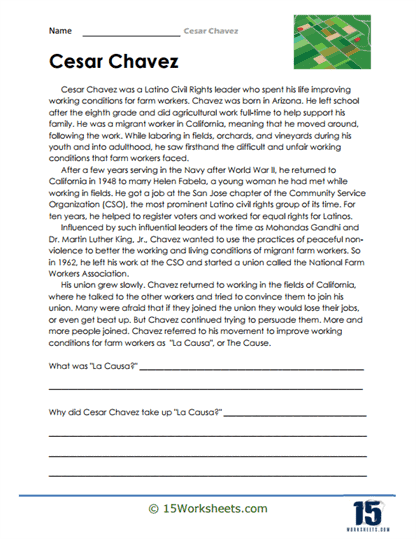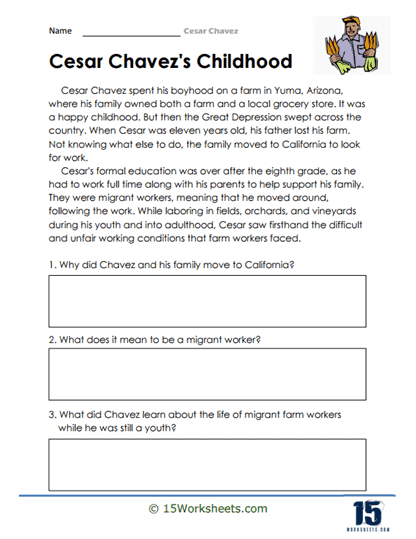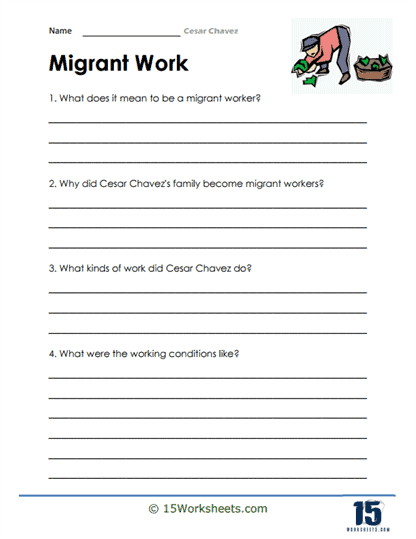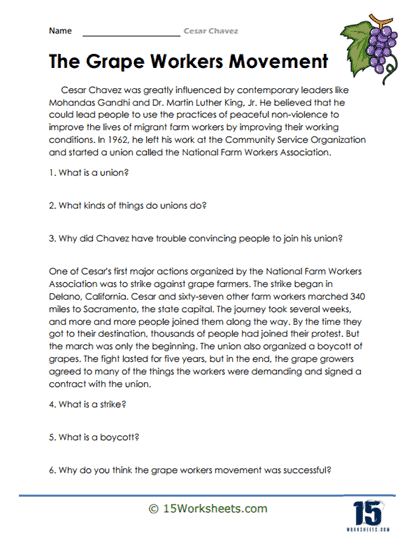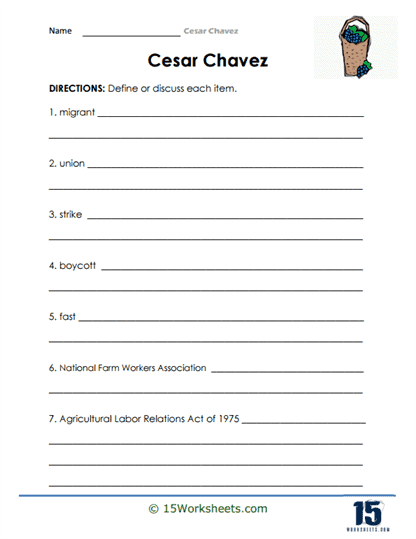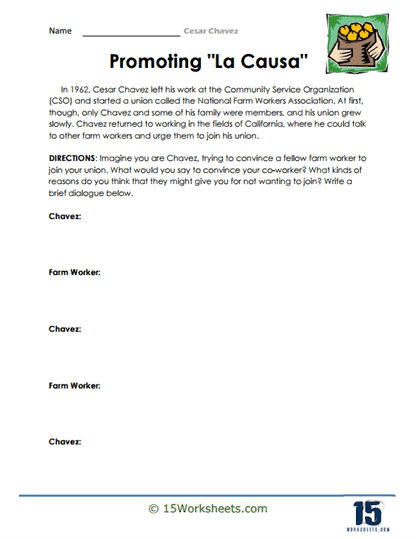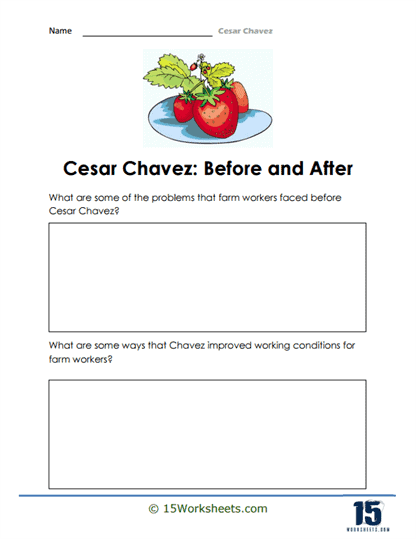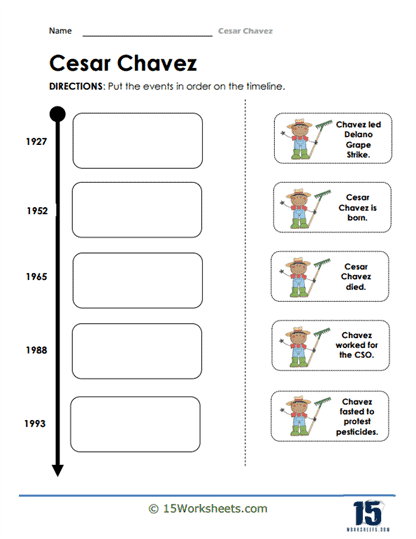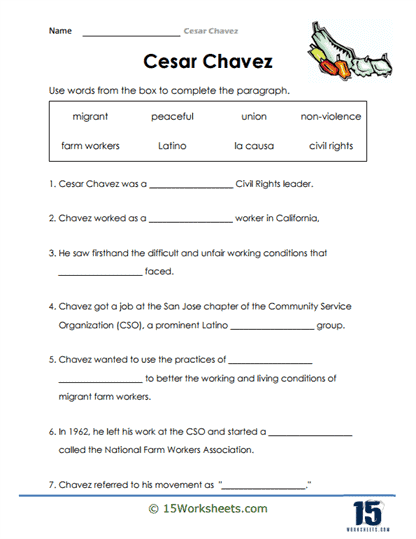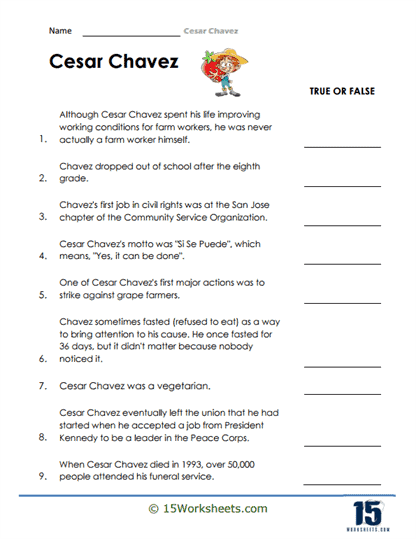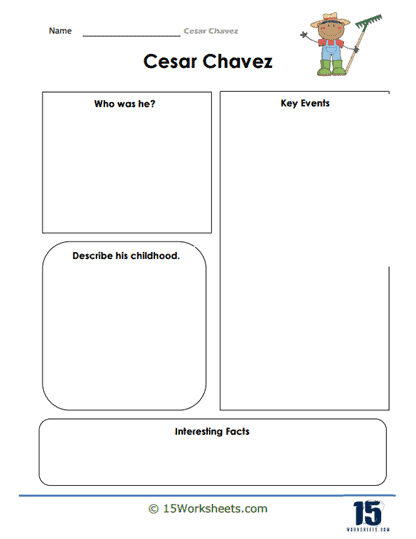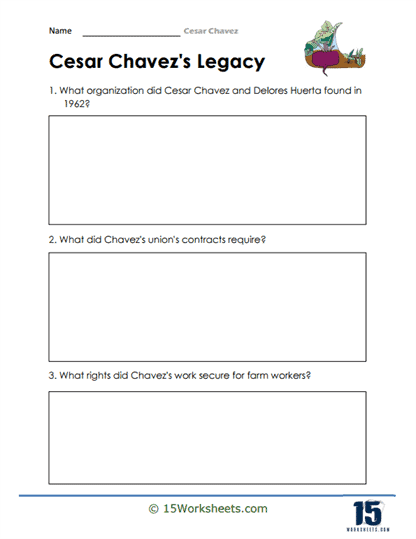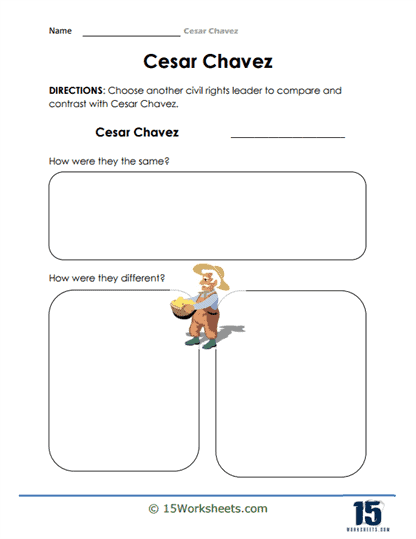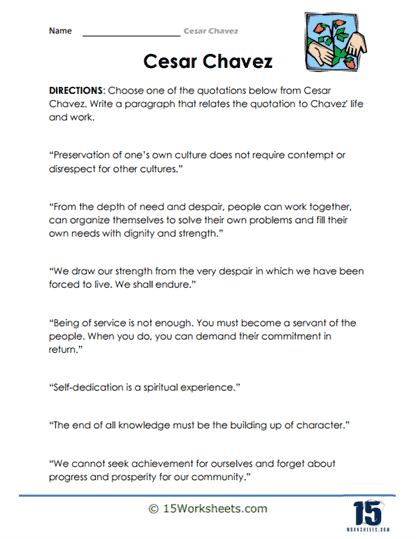Cesar Chavez Worksheets
All About These 15 Worksheets
Students learn all about the life and legacy of Cesar Chavez with this series of 15 worksheets. This collection is designed to introduce students to the remarkable achievements of Cesar Chavez, a prominent civil rights and labor leader who dedicated his life to fighting for the rights and dignity of farmworkers. Through a wide range of activities and thought-provoking exercises, students will gain a deeper understanding of Chavez’s contributions, his impact on the labor movement, and his lasting legacy as a champion of social justice. Through these worksheets, students will:
- Explore Chavez’s background, upbringing, and the social and economic conditions that influenced his activism;
- Learn all about what it means to be a migrant worker;
- Investigate the events leading up to the strike, its impact on the farm labor movement, and the boycott campaigns that garnered national attention and support;
- Expand their vocabulary by defining related terminologies like boycott, strike, migrant, or other more specific terms like the Agricultural Labor Relations Act of 1975;
- Reflect on Chavez’s vision and motivations and put themselves in his shoes by thinking of ways they can persuade other workers to join his cause;
- Study the key events and put them in the correct order;
- Synthesize everything they have learned to create their own infographic about Cesar Chavez;
- Compare and contrast Cesar Chavez with another civil rights leader;
- Express their own thoughts about the notable quotations said by Cesar Chavez after deciphering how it relates to his cause;
- Consider Chavez’s influence on subsequent movements, the ongoing struggles faced by farmworkers, and the importance of grassroots activism in effecting change.
This series of worksheets helps students develop a broader understanding of Cesar Chavez’s contributions, his tireless advocacy for farmworkers’ rights, and his enduring legacy as a symbol of social justice. Through the various exercises and activities, students will develop critical thinking skills, empathy, and a greater appreciation for the power of grassroots activism in bringing about meaningful change. Overall, this series aims to inspire students to stand up for social justice and to honor the memory of Cesar Chavez by advocating for a more just and equitable society.
Who Was Cesar Chavez?
Cesar Chavez (1927-1993) was an influential American civil rights and labor leader who co-founded the National Farm Workers Association, which later became the United Farm Workers (UFW) union. Through his tireless efforts to improve the working conditions, wages, and rights of migrant farm workers, Chavez left an indelible mark on American history. This article delves into Chavez’s life, his accomplishments, and the lasting significance of his work in the fight for social justice and labor rights.
Cesar Estrada Chavez was born on March 31, 1927, in Yuma, Arizona, to a Mexican-American family of farm laborers. As a child, Chavez experienced firsthand the harsh realities of farm work when his family lost their farm during the Great Depression and became migrant farm workers in California. This early exposure to the challenges faced by farm workers, including low wages, inadequate housing, and lack of access to education, would later inform his life’s work as a labor and civil rights activist.
Chavez’s involvement in labor organizing began in the early 1950s when he joined the Community Service Organization (CSO), a Latino civil rights group. He quickly rose through the ranks, becoming a national director in the late 1950s. During his tenure at the CSO, Chavez honed his skills as a community organizer, learning about the power of grassroots activism and the importance of nonviolent resistance.
Formation of the National Farm Workers Association (NFWA)
In 1962, after leaving the CSO, Chavez founded the National Farm Workers Association (NFWA) with labor activist Dolores Huerta. The NFWA was established to address the long-standing grievances of farm workers, including low pay, inhumane working conditions, and a lack of bargaining power. Chavez and Huerta believed that by organizing farm workers into a union, they could collectively negotiate for better wages and working conditions.
The NFWA’s early years were marked by grassroots organizing efforts, including meetings, house visits, and the establishment of a newspaper, El Malcriado, which aimed to raise awareness of farm workers’ struggles. Chavez’s commitment to nonviolence, inspired by figures like Mahatma Gandhi and Martin Luther King Jr., was a central tenet of the NFWA’s approach to organizing and activism.
The Delano Grape Strike and the Birth of the United Farm Workers (UFW)
In 1965, the NFWA joined forces with the Agricultural Workers Organizing Committee (AWOC), a predominantly Filipino-American farm workers’ group, to launch the Delano Grape Strike in California. The strike, which lasted five years, sought to improve wages and working conditions for grape farm workers. The workers employed various nonviolent tactics, including picketing, boycotts, and hunger strikes, to bring attention to their cause.
In 1966, the NFWA and AWOC merged to form the United Farm Workers (UFW), with Chavez serving as its first president. The UFW’s influence grew throughout the late 1960s and 1970s as it expanded its membership and won a series of important labor contracts with grape growers.
The UFW’s successes were due, in large part, to Chavez’s leadership and his ability to inspire and mobilize farm workers, as well as his commitment to nonviolent resistance. The Delano Grape Strike captured the attention of the American public, and it became a symbol of the broader struggle for civil and labor rights in the United States.

